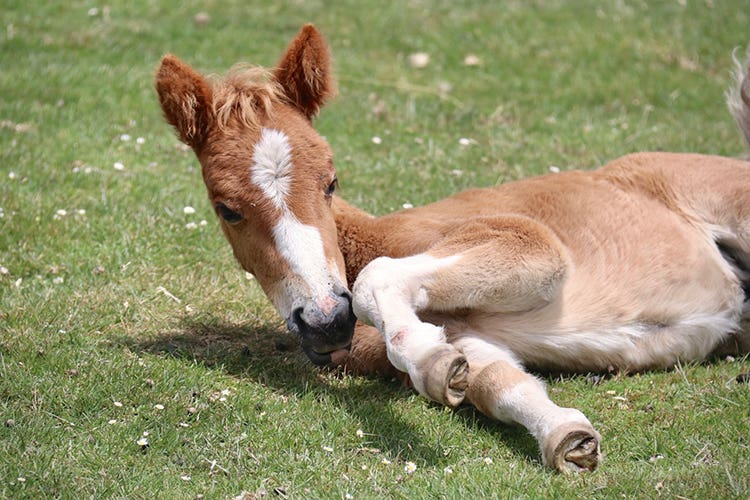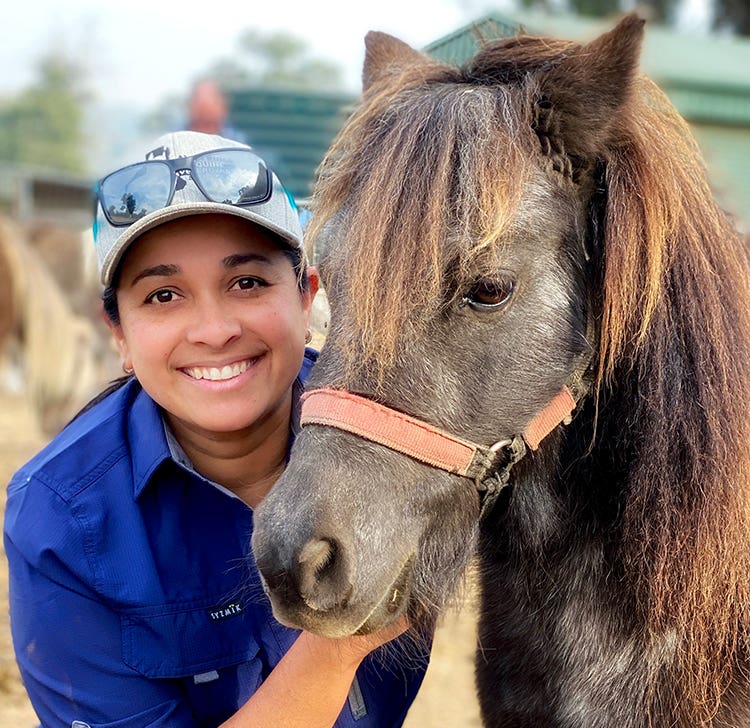Read time: 4-5 mins
Dr Tania Sundra explains why horse owners in Australia are becoming increasingly aware that calendar-based, rotational deworming programs pose a significant threat to their foal’s welfare.


Whilst targeted strategies for deworming adult horses are relatively straightforward, foals and young horses do present particular challenges. This is also the most vulnerable age group with the most to lose if parasite resistance develops on their property. In this blog we learn about the key parasites of foals and how to reduce parasite disease in foals.
1. What are ascarids?
The most important parasite of foals are ascarids (Parascaris equorum and Parascaris univalens). Foals become infected with this larvae through what’s known as the faecal-oral route – this simply means they ingest grass which is contaminated with the parasite eggs. Once they’re inside the foal’s digestive tract, they start a lengthy migration through their body. From the intestines, the larvae migrate through the airways and trachea, up to the pharynx and mouth where they are coughed and then swallowed to reach the small intestine once again where they spend most of their life.
Ascarid eggs are round and have a very thick, brown shell which makes them very resilient in the environment. They can tolerate a lot of adverse weather conditions like extreme temperatures, frosts etc. This is important to know as if foals are turned out on paddocks where manure has not been picked up, it’s likely that infective ascarid eggs will still be present in the environment and able to infect your foal.
2. Do ascarids cause disease?
Yes, they do. They’re one of the most important parasites in foals. Ascarids, when present in large numbers start to compete with the host (ie. foal) for nutrients. This can lead to stunted growth, rough hair coat, pot belly appearance and sometimes diarrhoea. As we mentioned above, ascarids hang out in the small intestine and if they are present in large enough numbers, they can clog the intestine and lead to colic, which may require surgery.
The presence of ascarids eggs is not based on geography. Every foal, everywhere in world is going to be exposed to ascarids. At around 2.5-3 months of age, the foals start to shed ascarid eggs in their manure. This continues to around 8 months. Peak shedding of ascarid eggs tend to occur around 3-6 months of age and gradually tapers from there, although some yearlings may also shed large numbers of ascarids. This is where faecal egg counts are really important to determine what dewormer you should be using based on what parasite you need to target.
3. What should I deworm my foal with?
Owners need to be aware that there’s a lot of drug resistance reported in this parasite. This means that many of the deworming products available are not effective at killing ascarids. Ivermectin is not effective against ascarids and moxidectin is not labelled for younger foals. Moxidectin has the same mode of action as ivermectin, so if ivermectin does not work, moxidectin is not going to either. Wormers which contain compounds like fenbendazole, oxfendazole etc. belong to a different class of drug which has a different mode of action to kill ascarids. They are known as “slow kill” as they kill the worms little by little, over the course of a few days, rather than paralysing them all at once. This means the risk of the worms “clogging” the small intestine as they die is substantially lower, although if present in high enough numbers could, still occur.
4. When should I deworm my foal?
Current recommendations suggest that foals should receive their first deworming no earlier than 8-12 weeks of age with a benzimidazole dewormer, such as Virbac Strategy-T®. There’s no point deworming foals any earlier as it’s unlikely that parasites will be present in sufficient numbers to warrant a worming treatment. Faecal egg counts should be performed every two months once the foal reaches 6 months of age to determine whether they are shedding strongyles or ascarids. Read our ‘Guide To Faecal Egg Counts’ here. Whilst this article has focussed mainly on ascarids, strongyles also pose a threat to the health of youngstock. Oxfendazole dewormers are largely ineffective against strongyles, which is why faecal egg counts are so important to guide your choice of dewormer.
5. What else can I do to help reduce parasite disease in my foal?
Foals should be turned out onto the “cleanest” pasture. Dose-and-move strategies are no longer recommended as they may result in contamination of pasture with resistant parasites. Manure should be removed at least weekly or twice weekly from pasture. See our range of manure collectors here. In larger breeding operations, foals should be grouped by age and younger foals should not be placed on pasture previously grazed by foals born earlier in the year. Foals and young adults are responsible for excreting the highest number of worm eggs onto pasture and paddocks should be rested after it has been grazed by youngsters.
If resistance to common dewormers continues to increase, owners and breeders of young horses have the most to lose. Employing simple techniques like faecal egg counts and targeted treatments will inevitably result in financial savings in the short-term and help ensure the health of your foal in the long term.
Want to learn more? Join us for our online webinar in partnership with Virbac on 25th October featuring guest speaker Dr Tania Sundra BSc.(Hons) BVMS MANZCVS (Equine Medicine) from Avon Ridge Equine Veterinary Services. Dr Sundra will be talking about the topic ‘Worm Control: What, When & Why?’ And just by attending you have the chance to win one of two $100 Horseland gift cards or a $100 Virbac health pack. Register here.
At Horseland we’re here to help care for your horse’s wellbeing. We offer all the essentials to keep your horse healthy and happy, from wormers and equine first aid supplies, to supplements and pest control. Browse our full range of horse health products online and in-store.


Written By Dr Tania Sundra BSc.(Hons) BVMS MANZCVS (Equine Medicine)
Avon Ridge Equine Veterinary Services, Western Australia
On behalf of Virbac

